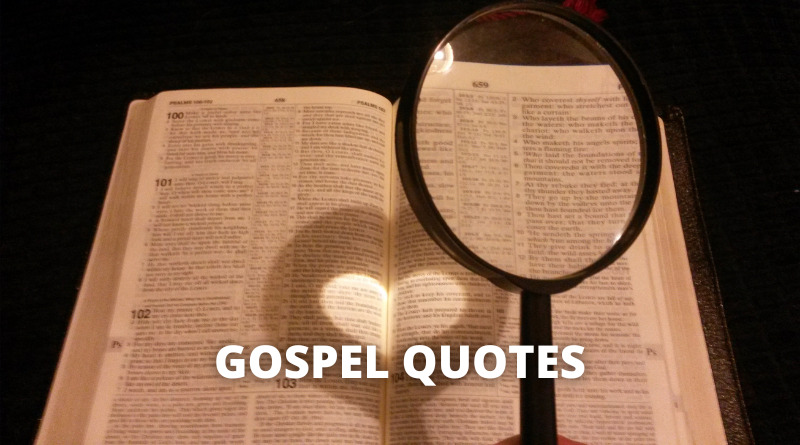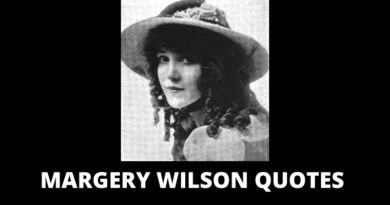These gospel quotes will inspire you. Gospel is the message concerning Christ, the kingdom of God, and salvation or the record of Jesus’ life and teaching in the first four books of the New Testament.
A collection of motivating, happy, and encouraging gospel quotes, gospel sayings, and gospel proverbs.
Best Gospel Quotes
- “If you believe what you like in the gospels, and reject what you don’t like, it is not the gospel you believe, but yourself.” Saint Augustine
- “What I did was take the Jesus of the Gospels, the Son of God, the Son of the Virgin Mary, and sought to make Him utterly believable, a vital breathing character.” Anne Rice
- “I was raised in a Catholic school, and I would always go to church on Sunday, and I would hear the same music over and over and over and over again, same gospels, hymns, everything.” Charlie Puth
-
“Heard in full sound, the Gospels tell about the establishment of a theocracy, and portray what theocracy looks like with Jesus as king.” N. T. Wright
- “Jesus Christ is the beginning, the middle, and the end of all. In the Gospels, he walks in human form upon the earth, and accomplishes the work of redemption.” Philip Schaff , Gospel quotes about Jesus
- “I realized at the age of 16 that unless I read the gospels, I would never have access to Renaissance art, to the music of Bach or the novels of Dostoevsky. So in the evenings, when the other boys went to play basketball or chase girls – I had no chance in either – I found my comfort in Jesus.” Amos Oz
- “I think the best way to view the Gospels is to view them as a magnificent portrait being painted by Jewish artists to try to capture the essence of a God experience that they believe they had with Jesus of Nazareth.” John Shelby Spong
-
“Where would Jesus be if no one had written the gospels?” Chuck Palahniuk
- “The Gospels record that nearly everywhere the Savior went, He was surrounded by multitudes of people. Some hoped that He would heal them; others came to hear Him speak. Others came for practical advice. Toward the end of His mortal ministry, some came to mock and ridicule Him and to clamor for His crucifixion.” Joseph B. Wirthlin
- “There’s nothing hippie about my picture of Christ. The Gospels paint a picture of a very demanding, sometimes divisive love, but love it is.” Bono , Gospel quotes about love
- “For ninety per cent of those who view him from outside, the Christian God looks like a great landowner administering his estates, the world. Now this conventional picture, which is too well justified by appearances, corresponds in no way to the dogmatic basis or point of view of the Gospels.” Pierre Teilhard de Chardin
-
“So far as I can remember, there is not one word in the Gospels in praise of intelligence.” Bertrand Russell
- “You know the phrase ‘Jesus laughed’ isn’t ever used in the Gospels. So, most people walk away with the idea that Jesus is a pretty serious guy, pretty sour-faced most of the time, pretty upset at what’s going on around Him.” John Eldredge
- “Jesus lived a life that was full of joy and contradictions and fights, you know? If they were to paint a picture of Jesus without contradictions, the gospels would be fake, but the contradictions are a sign of authenticity.” Paulo Coelho
- “As the gospels present it to us, the mission of Jesus of Nazareth is about the way in which the community of God’s people – historically, the Jewish people who had first received the law and the covenant – is being re-created in relation to Jesus himself.” Rowan Williams
-
“Reading the Gospels, without the personality of Jesus, is like watching television with the sound turned off.” John Eldredge
- “Fidel is a Marxist-Leninist. I am not. Fidel is an atheist. I am not. One day, we discussed God and Christ. I told Castro, I am a Christian. I believe in the Social Gospels of Christ. He doesn’t. Just doesn’t. More than once, Castro told me that Venezuela is not Cuba, and we are not in the 1960s.” Hugo Chavez
- “I am no theologian. I am a layman. I am among those who are preached to, and who listen. It is not for me to preach. I should not willingly forego being a listener, a man who reads the Gospels and then listens to what others say that our Lord meant. But sometimes a listener speaks out, and listens to his own voice.” Haniel Long
- “The Gospel of John makes explicit what all the Gospels assume – that is, the cross is not a defeat, but the victory of our God.” Stanley Hauerwas
-
“I know we didn’t make an anti-Semitic film. This is what the Gospels are. And it’s none of my business what other people think of me.” Jim Caviezel
- “There is no evidence that the author of the Book of Revelation, John of Patmos, read anything that we think of as a New Testament book. I don’t see any evidence that he knew what was in the Gospels, or the letters of Paul, which I don’t think he would have liked at all.” Elaine Pagels
- “Neither Muslims nor anyone else truly worships the true God if they reject Jesus as he really is in the Gospels.” John Piper
- “Startling as the Gospel of Judas sounds, it amplifies hints we have long read in the Gospels of Mark and John that Jesus knew and even instigated the events of his passion, seeing them as part of a divine plan.” Elaine Pagels
-
“Of the sayings of Christ in the Synoptic Gospels that can be compared to those in the fourth Gospel, there are one or two which I venture to think can only have been recorded on the authority of St. John.” Alfred Noyes
- “Instead of blaming victimization on the victims, the Gospels blame it on the victimizers. What the myths systematically hide, the Bible reveals.” Rene Girard
- “I always say that as a Christian I cannot find any passage in the Gospels in which Jesus condemned homosexuality.” Troy Perry
- “The Scarlet Gospels’ does, by general consensus, seem to mark a new high – or low, depending on your point of view – in its excessiveness, in its extremities.” Clive Barker
-
“In the Gospels, we are reminded, ‘The very hairs of your head are all numbered.’ And your numbered hairs, like your numbered days, recede daily.” Steve Rushin
- “To the first class belong the Gospels and Acts; to the second, the Epistles; to the third, the Revelation.” Philip Schaff
- “When the Bible and the Gospels say that the victims should have been spared, they do not merely ‘take pity’ on them. They puncture the illusion of the unanimous victimization that foundational myths use as a crisis-solving and reordering device of human communities.” Rene Girar
- “I was influenced very much by St. Francis of Assisi, whose idea was to radically live the gospel. He was not a priest, or even a brother. He was a layperson. His whole concept was to emulate Christ through the gospels, and to live it in a radical way.” Tom Catena
-
“If religion comes into the public square, it is as vulnerable as any other human institution to be pelted with produce. Ignorance does not become wisdom just because you gussy it up with the Gospels.” Charlie Pierce
- “The Gospels were written to present the life and teachings of Jesus in ways that would be appropriate to different readerships, and for that reason are not all the same. They were not intended to be biographies of Jesus, but selective accounts that would demonstrate his significance for different cultures.” John Drane
- “The stories about the life and teachings of Jesus were mainly told in Greek, the original language of the gospels.” Jay Parini
- “Digging into the creation of the Puritan mindset involved really trying to wrap my head around extreme Calvinism and what that’s all about. I now understand predestination, and I had to read the Geneva Bible cover-to-cover and read the gospels quite a bit to get into that world.” Robert Eggers
-
“I’ve said to others that there were places I had forgotten about that were just so powerful. I’ve read the Gospels many times, but it’s been a while since I’ve read through a whole book.” Michael W. Smith
- “I’m planning on finishing the Gospels at some point.” Chester Brown
- “The Passion narratives are the first pieces of the Gospels that were composed as a unity.” Hans Urs von Balthasar
- “There is nowhere in the four Gospels where Jesus uses the word ‘homosexual.'” Michael Moore
-
“The earliest books in the New Testament to be written were the Epistles, not the Gospels. It’s almost as though Saint Paul and others who wrote the Epistles weren’t that interested in whether Jesus was real.” Richard Dawkins
- “In Detroit, in a city that in many cases the world has rejected, that’s where God shows up. Every example in the Gospels where God shows up, it’s always when the seas are the stormiest, where there is discontinuity.” Clark Durant
- “We use the word ‘synoptic’ to talk about Matthew, Mark, and Luke, and it really means ‘seeing together,’ because they all have a similar perspective. Matthew and Luke – whoever wrote those Gospels – used Mark as a focus and as a basic story. So all of them have a lot in common.” Elaine Pagels
- “Once you start to look at the gospels one by one, you realize that followers of Jesus were trying to understand what had happened after he was arrested and killed. They knew Judas had handed him over to the people who arrested him.” Elaine Pagels
-
“For nearly 2,000 years, most people assumed that the only sources of tradition about Jesus and his disciples were the four gospels in the New Testament.” Elaine Pagels
- “There are some kinds of Christianity that insist you have to believe literally in doctrine. The Gnostic gospels open out the complexity and multiplicity of approaches to this. If you think the story of the virgin birth is mistranslated, for instance, it doesn’t mean you have to throw out the whole thing.” Elaine Pagels
- “The language of the Catholic Church – the liturgy, the prayer, the gospels – was in many ways my first poetry.” Alice McDermott
- “I would be cautious in embracing or rejecting doctrines. Had they been essential to our salvation, they would have been more explicitly declared in the Gospels, where we are so well taught the practice of every good word and work.” Dorothea Dix
-
“Then I studied theology in college, and when I was getting a Ph.D. in literature, I took courses in New Testament studies and studied Greek versions of the Gospels.” Jay Parini
- “I argue that the resurrection was not the Great Resuscitation. It was a total transformation. I just don’t accept the black-and-white thinking that goes along with needing to regard the gospels are literally true.” Jay Parini
- “The gospels were, in fact, written anywhere from forty to a hundred years after Jesus, and their authors attempted to demonstrate that Jesus could be seen to fulfill various Old Testament pronouncements.” Jay Parini
- “Who was Jesus anyway? After twenty centuries, there is not much anyone can agree on. The four canonical gospels don’t measure up to modern standards of biographical writing, and – outside of this material – there is precious little contemporary evidence, apart from a few glancing mentions of Jesus or the movement centered on him.” Jay Parini
- “I believe that Jesus Christ existed and that He died for my sins. And I believe that what He said in the Gospels is a model for the way I should try to lead my life and that I will always fall short of that and, therefore, need Him to redeem me.” John Dickerson




